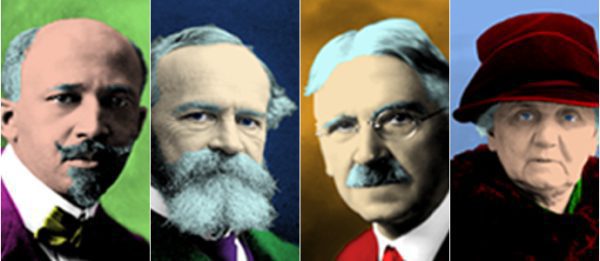Pragmatic Pursuits: Scholar Recaptures Biology, Philosophy Conversation

In the contemporary world, natural sciences and philosophy may seem to be worlds apart. Yet, these disciplines are not always estranged.
“I think now, when we think about biology and philosophy, it’s more about reducing philosophical theories to biology or thinking that we could talk about ethics in strictly biological terms,” says Trevor Pearce, a UNC Charlotte philosophy assistant professor.
“But I think the early pragmatists offer us a different way of engaging with biology, where we’re not reducing culture to biology or reducing ethics to biology,” Pearce says. “Rather, we’re using this kind of biological paradigm to think in a new way about things like ethics or knowledge. Thinking of ourselves in a biological way doesn’t have to mean that we’re just reduced to our biology.”
Pearce currently is researching the historical connections between philosophy and biology. He has published book chapters and papers on the topic, including in Journal of the History of Ideas, and the Journal of the History of Philosophy.
 His National Science Foundation-funded book project, Pragmatism’s Evolution: Organism and Environment in American Philosophy, is exploring how developments in the life sciences at the end of the 19th century shaped the ideas of American philosophers such as William James, John Dewey, Jane Addams, and W. E. B. Du Bois.
His National Science Foundation-funded book project, Pragmatism’s Evolution: Organism and Environment in American Philosophy, is exploring how developments in the life sciences at the end of the 19th century shaped the ideas of American philosophers such as William James, John Dewey, Jane Addams, and W. E. B. Du Bois.
“They’re one of the first groups of philosophers to be directly influenced by the ideas of Darwin and other evolutionary thinkers,” Pearce says. “They were there at just the right time for that to happen. The book is about how biological ideas affected the ideas of these particular philosophers. So, my work tries to recapture this conversation between biology and philosophy happening around 1900.”
These philosophers focused largely on the practical implications of philosophy, viewed through the lens of experimentation. They believed philosophical theories should be judged by their practical results, thus, the name pragmatism.
“Pragmatists try to put theories into practice and see what happens,”
he says, “They are experimenting in philosophy in the same way that people
experiment in science.”
For those curious about the advent of pragmatism and its relevance to modern research, the book may broaden their notions of what falls under the name of pragmatism. “It may appeal to those already interested in the question of how evolution changed our way of thinking, and what it means to be human,” Pearce says.
Pearce looks specifically to biological debates and science of the 19th century, an important period for academic discourse.
“All the debates at this time were really about how evolution works,” he says. “Everyone kind of accepted that evolution happens, but they were still debating about how it worked.” This wider acceptance of evolution as reality provided an intellectual climate for philosophers to participate in more practical thinking.
“Looking back, we don’t usually realize that philosophers are following along with these scientific debates,” he says. “But, if you look at the footnotes, there’s just clue after clue that those connections were there.”
He first found these hints while completing his dissertation. “I got interested in the interaction between organisms and their environments and discovered that these philosophers working at the end of the 19th century were also really focused on this question about organism environment interaction,” he says
During his research, Pearce recognized a pattern in the language used. “I noticed a striking use of biological vocabulary that we don’t see as much in philosophy now,” he says. “So, just following up citations to various biologists at the time is what really led to the project.” He continued to systematically look at other philosophers of the time, tracing the “biological roots” of their thinking.
He is sifting through published and archival sources, such as library records of universities attended by prominent pragmatists. He parses lecture notes from their classes and letters of correspondence among philosophers and biologists to find these connections.
“W. E. B. Du Bois, this famous thinker about race, took a class with William James at Harvard in 1889,” he says. “It was a class on theistic ethics, sort of religion inspired ethics, the last class where you’d expect a discussion of evolution to happen. But, we actually have Du Bois’ notes from that class and there’s a whole section where James talks about different views of evolution and how it works. Because it turns out, the religious ethics that he’s talking about in that class is opposed to evolution and so evolution comes up a lot.”
Pearce has incorporated into his classroom selected results of his research. The innovative method of thought utilized by pragmatists, he believes, can prove relevant to contemporary education.
“One of them, John Dewey, says pragmatism is really an experimental attitude,” he says. “I happen to think that the approach that they take, especially this experimental attitude, is still a useful attitude to have today.”
Words: Alexandra Celender | Illustration: Robyne Pomroy | Images: commons.wikimedia: Du Bois (clockwise, from top), Addams, Dewey, James | Image of Pearce: Lynn Roberson